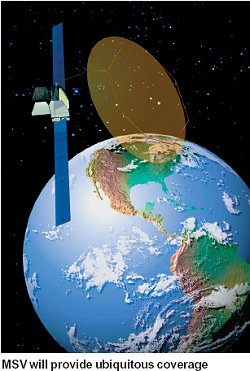Mobile Satellite Ventures (MSV) has awarded Boeing a contract for three high-power spacecraft to support its next-generation hybrid satellite and terrestrial mobile communications service in North and South America.
 Boeing’s first major commercial order since the $1 billion deal signed in 1997 to supply two similar geo-mobile GEM satellites to the United Arab Emirates’ Thuraya, the new contract is worth “well over $500 million at the low end and under $1 billion at the high end”, says MSV vice-chairman and chief executive Alexander Good. The contract includes ground systems and optional satellites.
Boeing’s first major commercial order since the $1 billion deal signed in 1997 to supply two similar geo-mobile GEM satellites to the United Arab Emirates’ Thuraya, the new contract is worth “well over $500 million at the low end and under $1 billion at the high end”, says MSV vice-chairman and chief executive Alexander Good. The contract includes ground systems and optional satellites.
The 702-series GEM satellites will weigh 5.5t at launch and generate 11kW of power, with a 22m (72ft)-diameter L-band reflector and ground-based beam-forming enabling the use of cellphone-size handsets for combined satellite and terrestrial communications.
The five-panel solar arrays will use triple-junction gallium-arsenide cells.
The first satellite will take 44 months to build and will be launched in 2009, the others following at five-month intervals, says Howard Chambers, vice-president of Boeing Space & Intelligence Systems.
MSV-1 will be located at 101°W in geosynchronous orbit, serving the USA; MSV-2 at 107.3°W, serving Canada; and MSV-SA at 63.5°W, serving Latin America. MSV will select the launch provider, with the satellites capable of being orbited by Sea Launch, Russia’s Proton and other vehicles.
MSV’s hybrid wireless communications service will use satellites to provide ubiquitous coverage, augmented by terrestrial cell stations to prove the power and capacity needed in urban areas, and using handsets that are the same size and cost as standard cellphones.
The Reston, Virginia-based satellite communications provider demonstrated the concept last year using its two existing satellites and modified CDMA cellphones, and is to develop hybrid handsets for use with any of the major mobile telephone technology standards.
GRAHAM WARWICK / WASHINGTON
Source: Flight International























